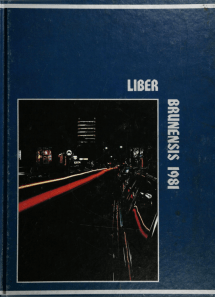Abstract
This interview with members of the Brown University class of 1981 summarizes the undergraduate experiences of Alice Wheelwright, Clare Boerschlein, Virginia Tortolani, Marie-Armide Longer Ellis, Kathryn Streator, and Suzanne Patrice Curley, at their 25th reunion.
The interviewees begin by introducing themselves and explaining why they chose to attend Brown. They share their first experiences on campus, mentioning the blizzard of 1978 and their inability to find guidance for managing the new curriculum that eliminated course requirements. This leads to deeper recollections of their favorite professors including Barbara Tanenbaum, Rosemary Pierrel Sorrentino, and Harriet Sheridan, and more generally they remember courses that they took and sports teams that they joined.
A significant portion of the interview is dedicated to discussing social life in the dormitories and how it felt to be a female student at Brown. The interviewees note that they felt socioeconomic class was insignificant and often went unnoticed. They also describe the different jobs that they held on and off campus and their various reasons for working while in school.
The interview concludes with a detailed discussion about women reentering the workforce after having children and various ways organizations could make this an easier and more positive transition.
Recorded on May 26, 2006
Interviewed by Jane Lancaster
Suggested Chicago style citation: 25th Reunion, class of 1981. Interview. By Jane Lancaster. Pembroke Center Oral History Project, Brown University. May 26, 2006.
Biography
During the class of 1981’s senior year, the much admired chaplain Dick Dannenfelser was fired from Brown University after thirteen years of service due to budget cuts. Faculty petitions and student protests ensued but the university upheld their decision. The university also cut back on financial aid due to a $600,000 overage for the 1980-1981 fiscal year, limiting aid only to incoming freshman. Students continued their protests, this time because of the minority and lower-income students who would not be able to attend or remain at Brown. Again, the decision was upheld and almost two hundred students were denied admission because of their inability to pay.
Though it was a difficult time for the Brown community, the university was able to invite prominent individuals to speak on campus. Vice President Walter Mondale, Representatives Bella Abzug and John Anderson, Senator George McGovern, and Ambassadors Herbert Okun and Andrew Young, all spoke on campus during the 1981 academic year.
